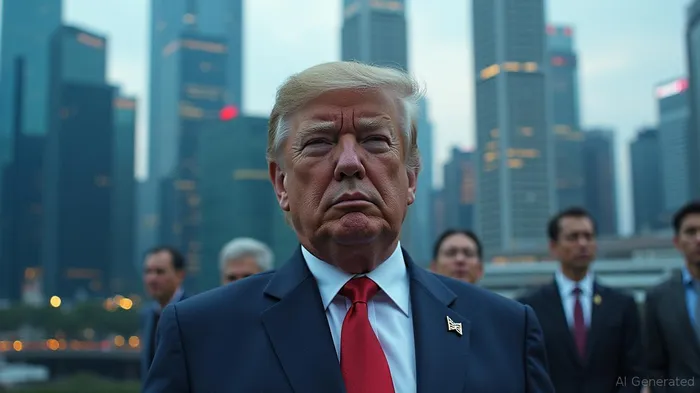Singapore Orders Unlicensed Crypto Exchanges to Shut by 2025, Bitget and Bybit Plan Exit
Singapore's Monetary Authority (MAS) has issued a final directive requiring all unlicensed digital assetDAAQ-- exchanges to cease operations by June 30, 2025. This move has prompted major crypto exchanges, including BitgetBIT-- and Bybit, to plan their exit from the city-state. The MAS's decision mandates that all digital token service providers without a formal license under the Payment Services Act must halt their overseas activities. This directive leaves little room for negotiation and applies even to firms awaiting full approval. The MASMAS-- has made it clear that offshore exchanges with front-office teams or international customers are included in the ban.
Bitget has already begun making plans to move its staff out of Singapore. The company will reassign team members to Dubai and China Hong Kong, where licensing frameworks are more open to crypto firms. Bybit is reportedly exploring similar options, although it has not confirmed its next steps. Dubai and China Hong Kong have become magnets for digital asset platforms looking to navigate tightening rules elsewhere. Dubai’s Virtual Asset Regulatory Authority has granted licenses to more than 20 firms, including Binance and Bybit, under a regime that offers tax advantages and regulatory clarity. China Hong Kong, with its emphasis on cross-border interoperability and traditional finance infrastructure, has also drawn interest as it ramps up its digital asset initiatives.
Singapore, once viewed as Asia’s crypto haven, has adopted a more cautious stance in the wake of the 2022 market downturn that saw the collapse of local platforms. While the country continues to issue crypto licenses, authorities have limited advertising, warned retail investors, and imposed new controls on firms operating from within its borders. The MAS decision has sparked concern among industry insiders, with some warning that the clampdown could lead to significant job losses and diminish Singapore’s position in the global crypto economy. For now, firms with unlicensed overseas operations are scrambling to comply or relocate, signaling a shift in the region’s balance of crypto power.
The MAS's crackdown on unlicensed crypto exchanges is part of a broader effort to regulate the digital asset industry more stringently. The regulator has been increasingly vigilant in enforcing compliance with its licensing requirements, reflecting a global trend towards tighter oversight of the crypto sector. This move by Singapore is likely to have ripple effects across the region, as other jurisdictions may follow suit in tightening their regulatory frameworks. The exit of major exchanges like Bitget and Bybit from Singapore could also lead to a redistribution of crypto activities in the region, with Dubai and China Hong Kong emerging as potential new hubs for digital asset trading and innovation.
Regulations aim to curb money laundering in cross-border crypto operations. The MAS has mandated that all digital token service providers (DTSPs) should be licensed by June 30, 2025, or shut down. The action targets unlicensed crypto firms that have been providing their services to customers outside the country, which has caused the major exchanges, including Bitget and Bybit, to declare their exit from the city-state. The transaction will reduce risks such as money laundering in cross-border crypto transactions.
The MAS has put in place that firms have to meet a minimum capital requirement of SGD 250,000 and also require firms to pay a yearly license fee of SGD 10,000. Compliance failure is punishable by a fine of up to SGD 250,000 and/or a jail term. The regulator pointed out that no transitional period will be given, given the time that consultations on the subject were launched in 2022, firms had quite enough time to prepare.
Among the key crypto exchanges that were hit are Bitget and Bybit. The exchanges are looking at relocating staff to places like Dubai and China Hong Kong, where regulation may be friendlier. The shift follows Singapore taking a stricter approach with the Financial Services and Markets Act (FSM Act) of 2022, which requires all DTSPs to get licenses to conduct business on a cross-border basis.
The MAS added that it will award the licenses with caution, and it will also concentrate on awarding them to companies that have high standards on anti-money laundering as well as financial stability. As of June 2025, there are 33 companies that have a license to be DTSPs, and Coinbase is one of them. Compliance or departure is the stark decision for unlicensed enterprises.
Such a shift in regulation is an indicator of the willingness of Singapore to maintain its status as an international financial center and to address the risks of the crypto industry. The MAS also highlighted the susceptibility of the digital token services to illegal undertakings since they are internet-based, cross-border services.
The crackdown follows the trends in other nations to clamp down on crypto control. This was done similarly in China Hong Kong in mid-2024, with unlicensed exchanges being instructed to leave. A number of other jurisdictions, including the UAE and the Philippines, have joined the list of those that have improved their measures after being taken off the Financial Action Task Force (FATF) gray list.
The notice can put the crypto business in Singapore on hold, and this can impact hundreds of jobs in the country. To stay viable, the corporations will either have to reorganize or bear the price of compliance. This is a powerful statement by the MAS, which emphasizes its commitment to financial integrity, as opposed to the emergence of a crypto-hub.

Quickly understand the history and background of various well-known coins
Latest Articles
Stay ahead of the market.
Get curated U.S. market news, insights and key dates delivered to your inbox.



Comments
No comments yet